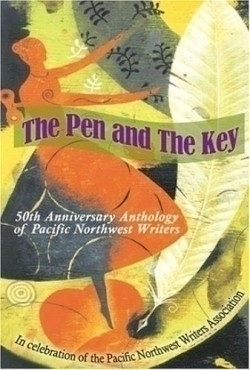
The Pen and The Key
- 2005 INDIES Finalist
- Finalist, Anthologies (Adult Nonfiction)
When Lucile McDonald and Zola Helen Ross founded the Pacific Northwest Writers Association (PNWA) fifty years ago, they could not have imagined, although they assuredly hoped, that their fledgling organization would still be around in 2005. That the success of their venture is so artistically displayed in this celebratory anthology is testament to their optimistic vision.
Yet, it is a means of celebration fraught with challenges. In a society motivated by instant gratification and informed by sound bites, one would presume that the reading public embraces literature that can be read in one sitting. Paradoxically, this is not the case, and anthologies of short fiction and poetry, especially regional ones, have limited appeal. What, then, would make this collection as relevant to residents of Portland, Maine, as it is to those of Portland, Oregon?
One need only look at the list of contributing authors to find the answer. Best-selling and award-winning writers—among them Terry Brooks, Stella Cameron, J. A. Jance, Marjorie Reynolds, and Ann Rule—bring a broad national recognition to the project. From Jance’s whimsically irresistible canine detective, to Reynolds’s affective tale of a fractious family reunion, to Cameron’s horrific, hypnotic story of rape and murder, the anthology is united not so much by theme as by the transcendence of the writing.
At no time does the caliber of the writing by such powerhouses threaten to overshadow that of those writers whose works may not be as well known. Five of PNWA’s newest members are showcased in the “Emerging Writers” section, and Dr. Phyllis Hollenbeck’s candid and cautionary essay, “Hollenbeck’s First Rule of Medicine,” alone is worth the book’s purchase price. Pulling no punches, Hollenbeck asserts that it is “not the gender of the doctor that counts but the degree of jerkdom,” exhorting readers to “find a physician whose brain crackles with the thrill of science and can also make a patient comfortable enough to tell their story.”
Is such vibrant writing a natural gift or a learned skill? Such is the conundrum explored in the “Writing About Writing” segment, five discourses in which PNWA members weigh in on the art of their craft. Regardless of the source of their talent, says Brooks in “Facing Down the Monster,” what unites writers is a commitment borne of courage and “a confidence of self that allows us to believe that we have something important and interesting to say.”
“Important” and “interesting” may not be the sexiest adjectives in the thesaurus, but they are solid criteria by which to judge all of PNWA’s writers—established and emerging—who have succeeded beyond McDonald’s and Ross’s wildest dreams.
Reviewed by
Carol Haggas
Disclosure: This article is not an endorsement, but a review. The publisher of this book provided free copies of the book to have their book reviewed by a professional reviewer. No fee was paid by the publisher for this review. Foreword Reviews only recommends books that we love. Foreword Magazine, Inc. is disclosing this in accordance with the Federal Trade Commission’s 16 CFR, Part 255.
